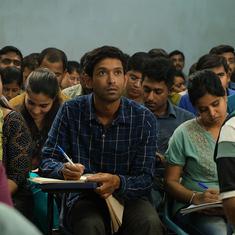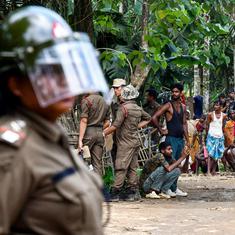Turkish nonprofit-backed group behind ‘Greater Bangladesh’ map that included parts of India: Centre
The map was displayed at an exhibition at Dhaka University on April 14, External Affairs Minister S Jaishankar told the Rajya Sabha.

The Indian government has taken note of reports that an Islamist group in Dhaka, allegedly backed by a Turkish non-profit organisation, had put out a map of a so-called Greater Bangladesh that included parts of India, said External Affairs Minister S Jaishankar on Thursday.
Speaking in the Rajya Sabha, Jaishankar claimed that the group, named Saltanat-e-Bangla, is supported by the Turkish Youth Federation.
The map was displayed at an exhibition at Dhaka University on April 14, during Poila Boishakh or the Bengali New Year celebrations, he added.
The minister was responding to a question by Congress MP Randeep Singh Surjewala, who sought details about the group’s activities and whether the Indian government had taken up the matter with Bangladesh.
Surjewala also asked if India had assessed the security implications of growing Turkish and Pakistani involvement in Bangladesh.
Jaishankar said the Bangladesh government’s fact-checking platform, named BanglaFact, had claimed that there was no evidence of the Saltanat-e-Bangla operating in the country.
It added that the map was displayed at a historical exhibition in reference to the “so-called earlier Bengal Sultanate”, the minister told the Rajya Sabha, adding that the event’s organisers have denied any affiliation with foreign political entities.
Jaishankar also said that India “remains focused in regard to Bangladesh on matters of national interest”.
“The government of India closely monitors all developments that have implications for India’s national security and continues to take all necessary measures to safeguard it,” the Union minister said in the reply.
Diplomatic ties between New Delhi and Dhaka have been strained since Sheikh Hasina resigned as the prime minister and fled to India on August 5.
Hasina fled following several weeks of widespread student-led protests against her Awami League government. She had been in power for 16 years and is considered a close ally of New Delhi.
Yunus, a Nobel laureate economist, took over as the head of Bangladesh’s interim government three days after Hasina fled.
Following the collapse of the Hasina government, several parts of Bangladesh reported incidents of violence against religious minorities.
Prime Minister Narendra Modi had urged Yunus in August to ensure the safety of Hindus and other minorities. Yunus, on his part, had claimed at the time that reports of attacks on religious minorities in Bangladesh had been exaggerated.









